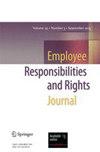Black Male Supervisors Navigating Racial Battle Fatigue: A Grounded Theory Approach
IF 1.7
Q3 INDUSTRIAL RELATIONS & LABOR
引用次数: 0
Abstract
Abstract A significantly relevant issue that affects Black men in the workplace is a condition known as racial battle fatigue (RBF). RBF fosters systemic and systematic occupational and economic disparities that are experienced by Black men more regularly than their White counterparts (Smith et al., 2007). This qualitative study utilized a constructivist grounded theory methodology based on interviews with 11 Black male supervisors to understand the meaning of their cognitive and behavioral experiences as they navigated microaggressions, microinequities, and vicarious racism. These experiences contribute to our understanding of RBF. The findings revealed that Black male supervisors in various industries encountered and experienced RBF in the workplace. In addition, this research revealed that participants were subjected to various subtle and overt forms of racial stress due to microlevel and macrolevel RBF. The participants’ stories identified epistemic employment injustice and white fear as obstacles and barriers that Black men in supervisory roles face because of RBF in the workplace. The study also indicated that participants deployed managing and coping strategies to address the emotional contagions and emotional trauma resulting from their experiences. This research has implications for workplace policy change initiatives, cultural training and education, intergroup dialog courses, and clinical health practitioners. Recommendations pertaining to interventions that address trauma, mental health, and maladaptive behaviors are provided.黑人男性主管应对种族战斗疲劳:一个扎根的理论方法
一个显著相关的问题,影响黑人男性在工作场所是一种条件被称为种族战斗疲劳(RBF)。RBF助长了系统性和系统性的职业和经济差异,黑人男性比白人男性更经常地经历这种差异(Smith et al., 2007)。本定性研究基于对11名黑人男性主管的访谈,采用建构主义理论为基础,了解他们在处理微侵犯、微不平等和替代种族主义时的认知和行为体验的意义。这些经验有助于我们对RBF的理解。研究结果显示,各行各业的黑人男性主管都在工作场所遇到并经历过RBF。此外,本研究还揭示了由于微观和宏观水平的RBF,参与者受到各种微妙和明显形式的种族压力。参与者的故事将认知上的就业不公正和白人恐惧视为黑人男性在工作场所因RBF而面临的障碍和障碍。研究还表明,参与者运用管理和应对策略来解决他们的经历造成的情绪传染和情绪创伤。本研究对工作场所政策改革倡议、文化培训和教育、小组间对话课程和临床卫生从业人员具有启示意义。提供了有关处理创伤、心理健康和适应不良行为的干预措施的建议。
本文章由计算机程序翻译,如有差异,请以英文原文为准。
求助全文
约1分钟内获得全文
求助全文
来源期刊

Employee Responsibilities and Rights Journal
INDUSTRIAL RELATIONS & LABOR-
CiteScore
2.20
自引率
9.10%
发文量
30
期刊介绍:
Employee Responsibilities and Rights Journal fosters development of the field of employee relations by presenting high-quality, peer-reviewed original research articles and by linking practitioner concerns involving the employment relationship with academic rigor. The journal is interdisciplinary in focus, drawing from a broad range of disciplines including ethics, organizational behavior, law, economics, sociology, social psychology, industrial and employment relations, administrative and organizational studies, and philosophy to further the understanding of both employee responsibilities and rights. The journal offers an international forum for the publication of scholarly peer-reviewed original research including qualitative and quantitative empirical studies, case studies, critical commentaries, and conceptual and dialectic presentations. In addition, Employee Responsibilities and Rights Journal publishes a Perspectives Section that showcases important contributions in formats other than the traditional research article. Such contributions include symposia/roundtable discussions, commentaries, review essays, interviews, and book reviews.
 求助内容:
求助内容: 应助结果提醒方式:
应助结果提醒方式:


